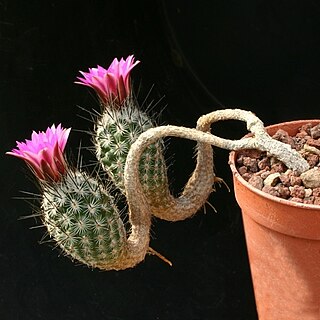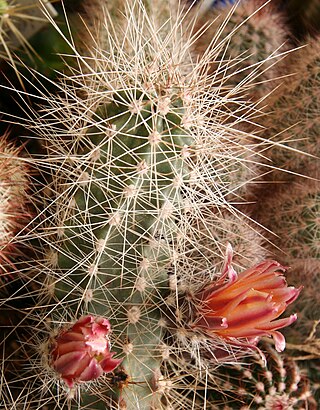
Herring are forage fish, mostly belonging to the family of Clupeidae.

The International Union for Conservation of Nature (IUCN) Red List of Threatened Species, also known as the IUCN Red List or Red Data Book, founded in 1964, is an inventory of the global conservation status and extinction risk of biological species. A series of Regional Red Lists, which assess the risk of extinction to species within a political management unit, are also produced by countries and organizations.

Thelocactus is a genus of flowering plants in the cactus family Cactaceae. Members of the genus are native to the arid lands of Central and Northern Mexico.
A data deficient (DD) species is one which has been categorized by the International Union for Conservation of Nature (IUCN) as offering insufficient information for a proper assessment of conservation status to be made. This does not necessarily indicate that the species has not been extensively studied, but it usually indicates that little or no information is available on the abundance and distribution of the species. It can also indicate uncertainty about the taxonomic classification of an organism; for example, the IUCN classifies the orca as "data deficient" because of the likelihood that two or more types of the whale are separate species.

Ariocarpus kotschoubeyanus is a species of plant in the family Cactaceae.

Cochemiea guelzowiana is a species of plant in the family Cactaceae. The species epithet guelzowiana honors the German cactus collector Robert Gülzow of Berlín.

Thelocactus hastifer is a species of plant in the family Cactaceae. It is endemic to Mexico. Its natural habitat is hot deserts.

Kadenicarpus horripilus is a species of plant in the family Cactaceae.

Turbinicarpus pseudopectinatus is a species of plant in the family Cactaceae.

Rapicactus subterraneus, synonym Turbinicarpus subterraneus, is a species of plant in the family Cactaceae. It is endemic to Mexico. Its natural habitat is hot deserts.

Thelocactus setispinus, commonly known as miniature barrel cactus or hedgehog cactus, is a species of cactus in the family Cactaceae.

Thelocactus hexaedrophorus is a species of cactus. It is endemic to Mexico.

Thelocactus rinconensis, synonyms including Thelocactus nidulans, is a species of cactus. It is endemic to north-east Mexico.

Thelocactus tulensis is a species of cactus. It is endemic to Mexico.

Thelocactus bicolor, the glory of Texas, is a species of flowering plant in the cactus family, widely distributed in the northern Chihuahuan Desert of Texas and Mexico.

Acharagma aguirreanum is a critically endangered microendemic cactus. It has a range of about one square kilometer in the calcareous semi-desert of the Sierra de la Paila in Coahuila, Mexico. Its population is estimated at less than 1000 individuals. Its only major threat is illegal collecting.

Aztekium hintonii, is a species of cactus in the genus Aztekium. It was discovered by George Sebastián Hinton in 1991.

Thelocactus macdowellii, called the Chihuahuan snowball, is a species of cactus native to northeastern Mexico. It has gained the Royal Horticultural Society's Award of Garden Merit.

Acharagma roseanum is a succulent cactus native to a small area of mountains of southeastern Coahuila and Nuevo León, Mexico. It grows on rocky limestone hills and xerophytic shrubland. Its name is often misspelled as "Roseana".

Echinocereus mapimiensis is a species of cactus native to Mexico.



















